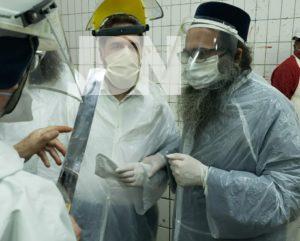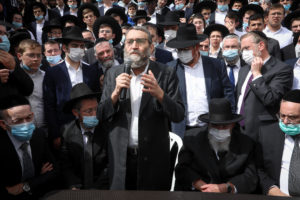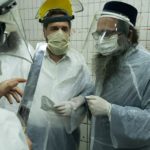A World Health Organization team emerged from quarantine in the Chinese city of Wuhan on Thursday to start field work in a fact-finding mission on the origins of the virus that caused the COVID-19 pandemic, AP reports.
The researchers, who were required to isolate for 14 days after arriving in China, left their quarantine hotel with their luggage in the midafternoon and headed to another hotel.
The mission has become politically charged, as China seeks to avoid blame for alleged missteps in its early response to the outbreak. A major question is where the Chinese side will allow the researchers to go and whom they will be able to talk to.
Hotel staff waved goodbye to the researchers, who were wearing face masks. The bus driver wore a full-body white protective suit. They drove about 30 minutes to a lakeside Hilton resort-like hotel.
Among the places they might visit are the Huanan Seafood Market, which was linked to many of the first cases, as well as research institutes and hospitals that treated patients at the height of the outbreak.
It hasn’t been disclosed whether they will leave Wuhan. One possible source of the virus is bats in caves in rural Yunnan province, about 1,600 kilometers (1,000 miles) southwest of Wuhan.
Foreign Ministry spokesperson Zhao Lijian said the experts would have talks, visits and inspections in China to carry out virus-tracing exchanges and cooperation. He did not provide any details.
The mission only came about after considerable wrangling between the two sides that led to a rare complaint from the WHO that China was taking too long to make the final arrangements.
China, which has strongly opposed an independent investigation it could not fully control, said the matter was complicated and that Chinese medical staff were preoccupied with new virus clusters in Beijing, Shanghai and other cities.
While the WHO was criticized early on, especially by the U.S., for not being critical enough of the Chinese response, it recently accused China and other countries of moving too slowly at the start of the outbreak, drawing a rare admission from the Chinese side that it could have done better.
Overall, though, China has staunchly defended its response, possibly out of concern over the reputational or even financial costs if it were found lacking.
Chinese officials and state media have also tried to cast doubt on whether the virus even started in China. Most experts believe it came from bats, possibly in southwest China or neighboring areas of Southeast Asia, before being passed to another animal and then to humans.
The origins search will try to determine where and exactly how that happened.
“We hope the U.S. can work with the Chinese side in a responsible manner, respect facts and science, and respect the hard work of the international expert team in tracing the origin of the virus,” he said, “so that they can conduct scientific research on the virus tracing without any political interference.”












